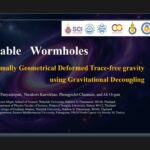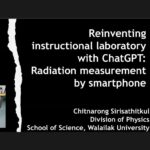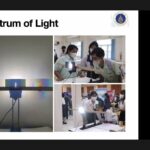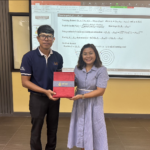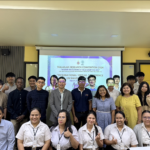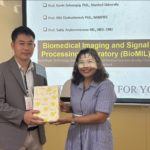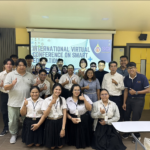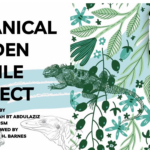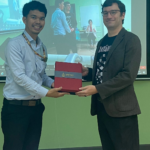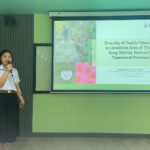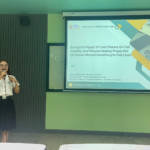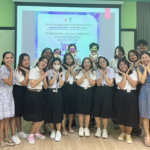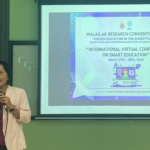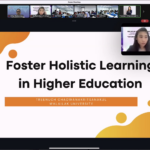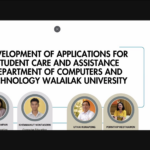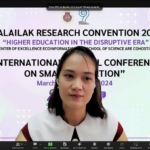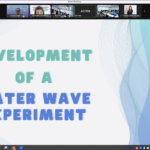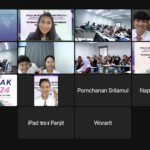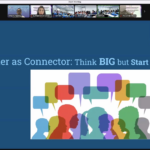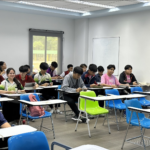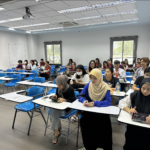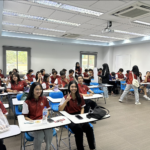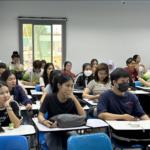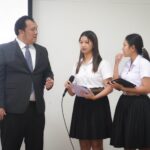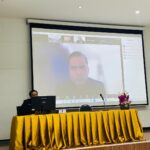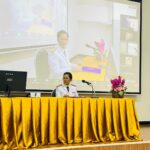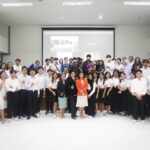Date: 28-29 March 2024
Venue: AD Building, Walailak University, Thailand, and online via Zoom Meeting
Organized by:
Center of Excellence for Ecoinformatics
School of Science
School of Accountancy and Finance
Executive Summary
The Center of Excellence for Ecoinformatics, the School of Science and School of Accountancy and Finance are pleased to host the International Virtual Conference on Smart Education. This conference brings together educators, researchers, and practitioners from around the world to discuss the latest developments in smart education.
The conference features six sessions covering a broad range of disciplines:
Biology (27 participants: 1 Keynote speaker, 7 faculties, 14 student presentations, 5 Undergrad students)
Mathematics and Statistics (46 participants: 2 Keynote speakers, 9 faculties, 11 MSc/PhD students, 10 student presentations, 24 Undergrad students)
Physics (42 participants: 3 Keynote speakers (1 Poland), 5 faculties, 1 student presentation, 33 Undergrad students/teachers/students)
Marine Science (55 participants: 3 Keynote speakers, 4 faculties, 2 student presentations, 46 Undergrad students)
Science Education (163 participants: 2 Keynote speakers (1 USA), 11 faculties, 3 student presentations, 150 Undergrad students)
Economics, Finance, and Accountancy (107 participants: 1 International Keynote speaker (UK), 27 faculties, 6 student presentations, 73 Undergrad students)
The conference provides a platform for participants to share their experiences, best practices, and research findings in smart education. We encourage you to attend the conference and learn more about how technology is transforming education across these vital fields.
Key Highlights
Total participants: 440 people
Keynote Speakers
Dr.Curt H. Barnes: Living large: snake diversity at Thailand’s biggest university campus, Walailak University
Dr.Uten Yarach: Magnetic resonance imaging in the era of artificial intelligence
Asst.Prof.Dr. Kiattisak Prathom: Nakhon Si Thammarat landslide prediction maps using machine learning methods
Asst.Prof.Dr. Tawinan Cheiwchanchamnangij: Reinventing physics laboratory for 21st-century undergraduate students
Prof.Dr. Tadeusz Wibig: Faculty of Physics and Applied Informatics, University of Lodz, Poland. “Cosmic radiation, what it is, and why it is worth studying”
Dr. Praulai Nootmorn: Empowering future generations: Thailand’s sustainable and smart marine fisheries management plan
Mr. Suthep Jualaong: Blue economy in Thailand: A case study of Trat province
Miss Khanittha Uthaipan: Deoxygenation in the linked central plain of Thailand’s rivers system and the upper gulf of Thailand
Dr. June Teison, President and CEO InnovateED 313, USA: Place-based education: Strengthen STEM Instruction with Vibrant Community Partnership.
Miss Treenuch Chaowanakritsanakul: Foster holistic learning with a technology-integrated approach
Dr. Rizwan Ahmed, University of Kent, UK: Senior Lecturer in Finance, Department of Finance, Kent Business School, University of Kent, United Kingdom “Exploring the Intersection of Cryptocurrency: Digital Currency and Innovation”
Research Collaborations and Outcomes
A significant highlight was the announcement of research collaborations between Poland, USA, UK and Thailand for smart education. This collaborative effort, led by Prof. Dr. Tadeusz Wibig: Faculty of Physics and Applied Informatics, University of Lodz, Poland. “Cosmic radiation, what it is, and why it is worth studying”, Dr. June Teison, President and CEO InnovateED 313, USA: Place-based education: Strengthen STEM Instruction with Vibrant Community Partnership, and Dr. Rizwan Ahmed, University of Kent, UK: Senior Lecturer in Finance, Department of Finance, Kent Business School, University of Kent, United Kingdom “Exploring the Intersection of Cryptocurrency: Digital Currency and Innovation” exemplifies the symposium’s role in fostering international partnerships and interdisciplinary research in education and sustainable developments.
Conclusion and Future Directions
The six sessions, encompassing disciplines like Biology, Mathematics and Statistics, Physics, Marine Science, Education, and Economic, Finances and Accountancy showcased the diverse applications of education, economic, technology and their application in education to enhance teaching and learning outcomes. Keynote speakers like Dr. Curt H. Barnes, Dr. Uten Yarach, Asst.Prof.Dr. Kiattisak Prathom, Asst.Prof.Dr. Tawinan Cheiwchanchamnangij, Prof. Dr. Tadeusz Wibig, Dr. Praulai Nootmorn, Mr. Suthep Jualaong, Miss Khanittha Uthaipan, Dr. June Teison, Miss Treenuch Chaowanakritsanakul, and Prof.Dr. Rizwan Ahmed provided insightful perspectives on topics ranging from artificial intelligence in healthcare, place-based education, and cryptocurrency to the study of cosmic radiation.
Looking ahead, the conference underscores the critical role of collaboration in advancing smart education. Future efforts should focus on fostering closer partnerships between educators, researchers, and industry leaders. This facilitates the development of innovative pedagogical practices, effective learning technologies, and data-driven strategies for continuous improvement. By harnessing the power of technology and forging strong collaborations, we can ensure that education remains relevant, engaging, and accessible for all learners in the years to come.

